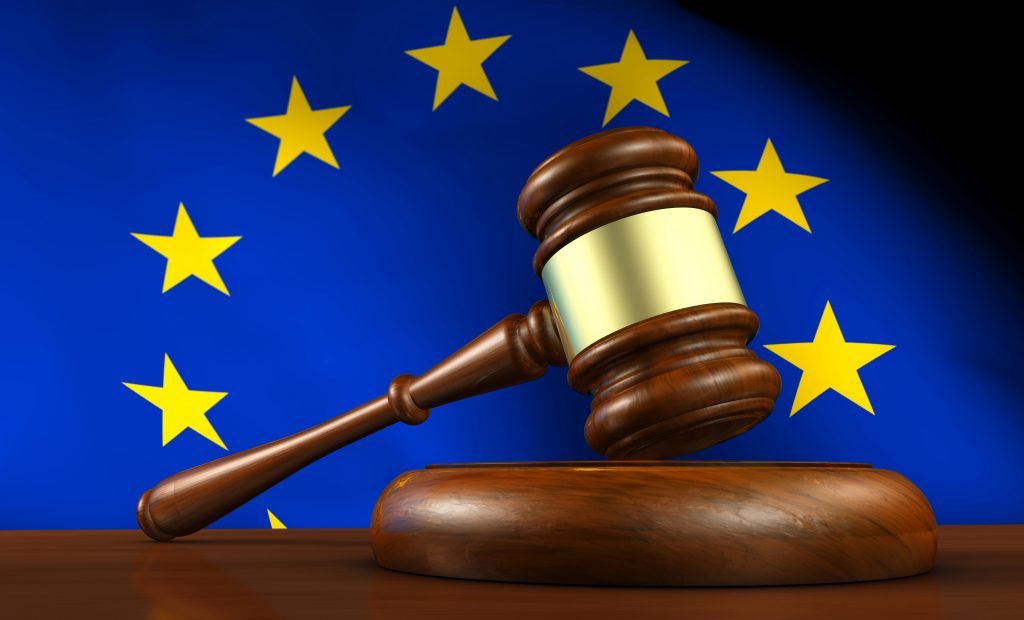In a boost to copyright owners, the Grand Chamber of the CJEU has agreed with copyright owners that an online seller of second-hand e-books was making an unauthorized communication to the public.
 The Grand Chamber of the Court of Justice of the European Union (CJEU) has ruled that supply to the public by downloading, for permanent use, of an e-book is covered by the concept of “communication to the public” rather than “distribution to the public.” (Nederlands Uitgeversverbond & Groep Algemene Uitgevers v Tom Kabinet Internet BV, Tom Kabinet Holding BV & Tom Kabinet Uitgeverij BV, Case C-263/18,ECLI:EU:C:2019:1111, December 19 2019.)
The Grand Chamber of the Court of Justice of the European Union (CJEU) has ruled that supply to the public by downloading, for permanent use, of an e-book is covered by the concept of “communication to the public” rather than “distribution to the public.” (Nederlands Uitgeversverbond & Groep Algemene Uitgevers v Tom Kabinet Internet BV, Tom Kabinet Holding BV & Tom Kabinet Uitgeverij BV, Case C-263/18,ECLI:EU:C:2019:1111, December 19 2019.)
Under Article 3(3) of Directive 2001/29/EC of the European Parliament and of the Council of 22 May 2001 on the harmonisation of certain aspects of copyright and related rights in the information society (Infosoc Directive), the communication to the public right is not exhausted by any communication to the public or making available to the public.
The dispute in this case was between two associations representing copyright holders on one hand and Tom Kabinet, which operates a website with a virtual market of second-hand e-books offered via a reading club, on the other hand. The associations argued that Tom Kabinet was making an unauthorized communication to the public.
In a boost to copyright owners, the Grand Chamber of the CJEU has agreed. Reviewing the WIPO Copyright Treaty (WCT) and the background to the Infosoc Directive, it reasoned that communication to the public should “be understood in a broad sense covering all communication to the public not present at the place where the communication originates and, thus, any such transmission or retransmission of a work to the public by wire or wireless means, including broadcasting.”
Distinguishing Computer Programs
The Court distinguished the case of e-books from that of computer programs, where it has previously ruled that there is no distinction between tangible and intangible copies. (UsedSoft, C-128/11, ECLI:EU:C:2012:407.) Computer programs are a special case, regulated by Directive 2009/24/EC of the European Parliament and of the Council of 23 April 2009 on the legal protection of computer programs.
Unlike computer programs, said the Court, the supply of a book on a material medium and the supply of an e-book cannot be considered equivalent:
“[D]ematerialised digital copies, unlike books on a material medium, do not deteriorate with use, and used copies are therefore perfect substitutes for new copies. In addition, exchanging such copies requires neither additional effort nor additional cost, so that a parallel second-hand market would be likely to affect the interests of the copyright holders in obtaining appropriate reward for their works much more than the market for second-hand tangible objects.”
The Criteria
In its Tom Kabinet judgment, The Court reiterated that communication to the public involves two cumulative criteria: an act of communication of a work and the communication of that work to a public. Tom Kabinet makes the works concerned available to anyone registered with the reader’s club, said the Court: “Accordingly, the supply of such a service must be considered to be the communication of a work within the meaning of Article 3(1) of Directive 2001/29, irrespective of whether that person avails himself or herself of that opportunity by actually retrieving the e-book from that website.”
As anyone can join the club, and there are no restrictions on downloads, “the number of persons who may have access, at the same time or in succession, to the same work via that platform is substantial.” The work therefore must be regarded as being communicated to a public.
This judgment is the latest ruling from the CJEU to interpret the communication to the public right in copyright law. It is broadly in line with the Advocate General’s Opinion in the case, which was published in September.
A press release summarizing the judgment is available here.
Image Source: Deposit Photos
Image ID: 78261856
Copyright: NiroDesign

![[IPWatchdog Logo]](https://ipwatchdog.com/wp-content/themes/IPWatchdog%20-%202023/assets/images/temp/logo-small@2x.png)

![[Advertisement]](https://ipwatchdog.com/wp-content/uploads/2024/04/Artificial-Intelligence-2024-REPLAY-sidebar-700x500-corrected.jpg)
![[Advertisement]](https://ipwatchdog.com/wp-content/uploads/2024/04/UnitedLex-May-2-2024-sidebar-700x500-1.jpg)
![[Advertisement]](https://ipwatchdog.com/wp-content/uploads/2024/04/Patent-Litigation-Masters-2024-sidebar-700x500-1.jpg)

![[Advertisement]](https://ipwatchdog.com/wp-content/uploads/2021/12/WEBINAR-336-x-280-px.png)
![[Advertisement]](https://ipwatchdog.com/wp-content/uploads/2021/12/2021-Patent-Practice-on-Demand-recorded-Feb-2021-336-x-280.jpg)
![[Advertisement]](https://ipwatchdog.com/wp-content/uploads/2021/12/Ad-4-The-Invent-Patent-System™.png)






Join the Discussion
4 comments so far.
Anon
December 29, 2019 11:18 amI was hoping that the person so “willing to engage” would pick up a discussion on the nature of digital goods, but I see that that hope was misplaced.
Anon
December 23, 2019 01:19 pmTFCFM,
Based on your own logic, what exactly do you own “on your end” when you BUY an e-book?
What happens every time you stop reading, close the app, come back later and reopen?
While I do think that you have ventured some thinking into what actually IS a digital good, I do not think that you have contemplated this enough, and what “secondary market” necessarily means for digital goods.
For example, actions incumbent for the sold good for what is sold (intended purpose) include the unlimited “recreating” that electronic processing entails.
What is “sold” on one end is NOT the “physical copy” of old.
To go down your path (absence of actual physical item changing hands), one COULD rightly ask if copyright is even established in the intangible item that is actually exchanged in a purchase of a digital good.
TFCFM
December 23, 2019 10:17 amSeems right to me. There’s no question that folks downloading an e-book are “making” new copies of the protected work.
If it were the case that upload of a prior authorized user’s copy of the work entirely extinguished all access of that prior user and permitted transfer of the work to one-and-only-one subsequent user (at a time, at least), my opinion might be different — but that does not appear to be the situation here, as reported:
“As anyone can join the club, and there are no restrictions on downloads, ‘the number of persons who may have access, at the same time or in succession, to the same work via that platform is substantial.’“
Anon
December 20, 2019 11:32 amThis is a horrible decision. The fact that a choice of producing a good that “does not age” is ENTIRELY the choice of the producer, and the subsequent fact that the producer then ENTIRELY of their own accord puts that ‘more durable’ good into the marketplace CANNOT be reasonable to so artificially stunt secondary markets.